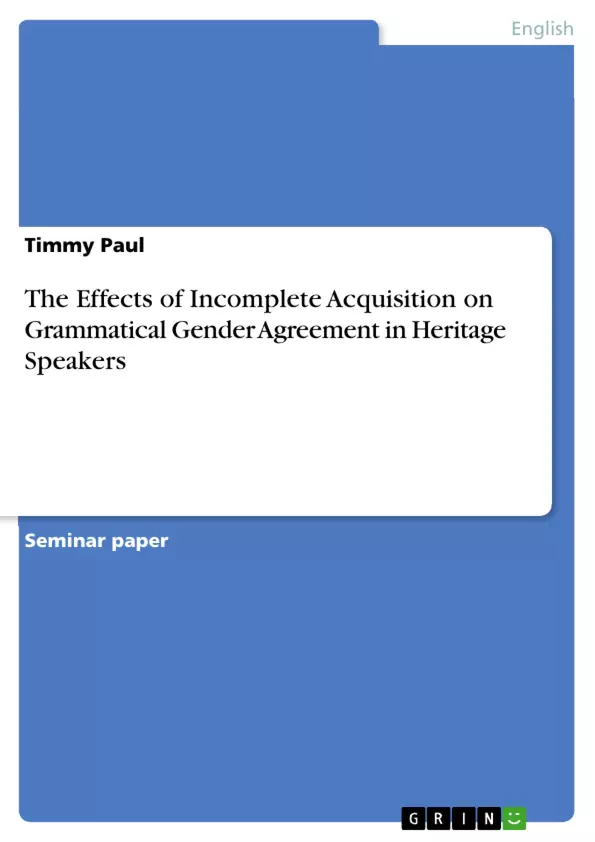The following paper compares and contrasts three different studies in order to investigate, whether grammatical gender agreement in heritage speakers involves incomplete acquisition, and if so, how gender agreement is affected by this and other factors like age of onset and context of acquisition. The papers by Montrul, Foote, & Perpiñán (2008) and Alarcón (2011) analyse Spanish heritage speakers, whereas the study by Polinsky (2008) focuses on American Russian heritage speakers. In this paper, all three studies are analysed in order to compare the participants, the procedure and the specific results concerning grammatical gender under incomplete acquisition across different languages. The analysis of the papers is followed by a general discussion of their main outcome. In the end, I will conclude the overall results and provide an outlook.
Inhaltsverzeichnis (Table of Contents)
- Abstract
- Introduction
- Study I
- Participants
- Experiment I
- Task and Materials
- Results
- Experiment II
- Task and Materials
- Results
- Experiment III
- Task and Material
- Results
- Discussion
- Study II
- Participants
- Experiment I
- Task and Materials
- Results
- Experiment II
- Task and Materials
- Results
- Discussion
- Study III
- Participants
- Experiment I
- Task and Materials
- Results
- Experiment II
- Task and Materials
- Results
- Discussion
- General Discussion
- Conclusion
Zielsetzung und Themenschwerpunkte (Objectives and Key Themes)
This paper aims to investigate the impact of incomplete acquisition on grammatical gender agreement in heritage speakers. By comparing three studies that analyze Spanish and Russian heritage speakers, the paper seeks to understand whether incomplete acquisition is a factor in gender agreement errors and how this factor might interact with age of onset and context of acquisition. The primary objective is to analyze the specific results of each study regarding grammatical gender under incomplete acquisition and to draw conclusions about the overall implications for heritage language research.
- The role of incomplete acquisition in grammatical gender agreement in heritage speakers.
- The influence of age of onset and context of acquisition on gender agreement accuracy.
- Comparing and contrasting the findings of different studies on heritage language acquisition across languages.
- Analyzing the specific errors made by heritage speakers in terms of gender, domain of agreement, and noun endings.
- Exploring the potential impact of incomplete acquisition on other linguistic domains.
Zusammenfassung der Kapitel (Chapter Summaries)
The first study by Silvina Montrul examines the relationship between age of onset and context of acquisition and gender agreement in Spanish noun phrases, comparing Spanish heritage speakers to adult L2 learners. The study explores the presence of gender agreement errors in both groups and analyzes the error patterns in terms of gender, domain of agreement, and noun endings.
The second study, while not specifically mentioned, likely examines a different aspect of grammatical gender agreement in heritage speakers, possibly focusing on a different language or a different set of experimental tasks. The summary would then highlight the key findings and how they relate to the overall research question.
The third study, again not specifically described, would be summarized in a similar manner, focusing on its contribution to the broader understanding of incomplete acquisition and its impact on grammatical gender agreement.
Schlüsselwörter (Keywords)
The key terms and concepts in this work include heritage language acquisition, incomplete acquisition, grammatical gender agreement, age of onset, context of acquisition, L1 attrition, bilingualism, error patterns, and cross-linguistic comparison. The paper also examines the specific features of Spanish and Russian grammatical gender and analyzes the different experimental methodologies employed in the research.
- Quote paper
- M.Ed. Timmy Paul (Author), 2017, The Effects of Incomplete Acquisition on Grammatical Gender Agreement in Heritage Speakers, Munich, GRIN Verlag, https://www.hausarbeiten.de/document/1169261


